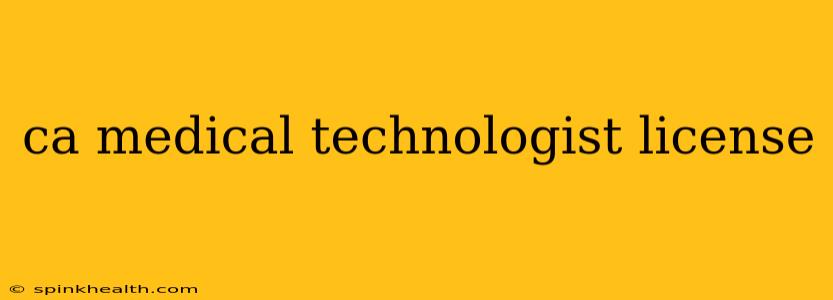Navigating the Path to Becoming a California Medical Technologist: A Comprehensive Guide
The dream of becoming a medical technologist in California is a rewarding one, filled with the potential to make a real difference in people's lives. But the path to licensure isn't always straightforward. This guide unravels the process, addressing common questions and offering insights to help you navigate this exciting journey.
Imagine this: you're meticulously analyzing samples, your expertise contributing to accurate diagnoses and effective treatment plans. This is the reality for California's medical technologists, and it’s a career that demands precision, dedication, and a strong understanding of the regulatory landscape.
What are the educational requirements for a medical technologist license in California?
California requires medical technologists to hold a bachelor's degree from an accredited institution, with specific coursework in medical technology or a closely related field. This rigorous training isn't just about memorizing facts; it's about developing critical thinking skills and the ability to interpret complex data. Think of it as mastering a scientific detective story, where each test result is a clue leading to a vital diagnosis.
Your education will delve deep into areas like hematology (the study of blood), microbiology (the world of bacteria, viruses, and fungi), clinical chemistry (analyzing the body's chemical components), immunology (understanding the body's defense mechanisms), and blood banking (ensuring safe blood transfusions).
How do I find accredited medical technology programs in California?
Finding the right program is crucial. The California Department of Public Health, Clinical Laboratory Improvement Amendments (CLIA) regulations, and the National Accrediting Agency for Clinical Laboratory Sciences (NAACLS) are your trusted guides. These organizations ensure programs meet high standards, preparing graduates for the challenges of the profession. Researching programs and visiting campuses will help you choose the one that best suits your learning style and career aspirations. Don't be afraid to speak to current students and alumni—their insights can be invaluable.
What exams do I need to pass to become a licensed medical technologist in California?
The American Society for Clinical Pathology (ASCP) Board of Certification (BOC) exam is a significant hurdle in the journey. This rigorous exam tests your knowledge and skills, demonstrating your readiness to practice as a competent medical technologist. Passing the BOC exam is the key that unlocks the door to licensure in California (and many other states). Preparation is key; many programs offer dedicated exam preparation resources, and you'll find extensive study materials online and in libraries.
What is the California medical technologist licensing process?
Once you've successfully passed the ASCP BOC exam, you'll apply for licensure with the California Department of Public Health. This involves providing documentation verifying your education, examination results, and other relevant information. The process is fairly straightforward, but it’s important to follow instructions carefully and submit all required documents promptly to avoid delays. Procrastination is your enemy in this stage of the game!
Are there different types of medical technologist licenses in California?
California's licensing structure ensures a high standard of care. While a general medical technologist license is the most common, there might be specializations requiring additional certifications or training. Always check the latest requirements from the California Department of Public Health for updated details on specialization paths.
What are the continuing education requirements for maintaining my license?
Professional development is an ongoing process for medical technologists. California mandates continuing education to keep your license active. This reflects the ever-evolving nature of medical technology, requiring professionals to stay abreast of the latest advancements.
The path to becoming a licensed medical technologist in California is a challenging but undeniably rewarding one. By understanding the educational requirements, licensing process, and continuing education needs, you can confidently navigate the journey and embark on a fulfilling career helping others. Remember to always stay informed about any changes in regulations and requirements. Your dedication and hard work will pay off as you contribute significantly to the healthcare system of California.

